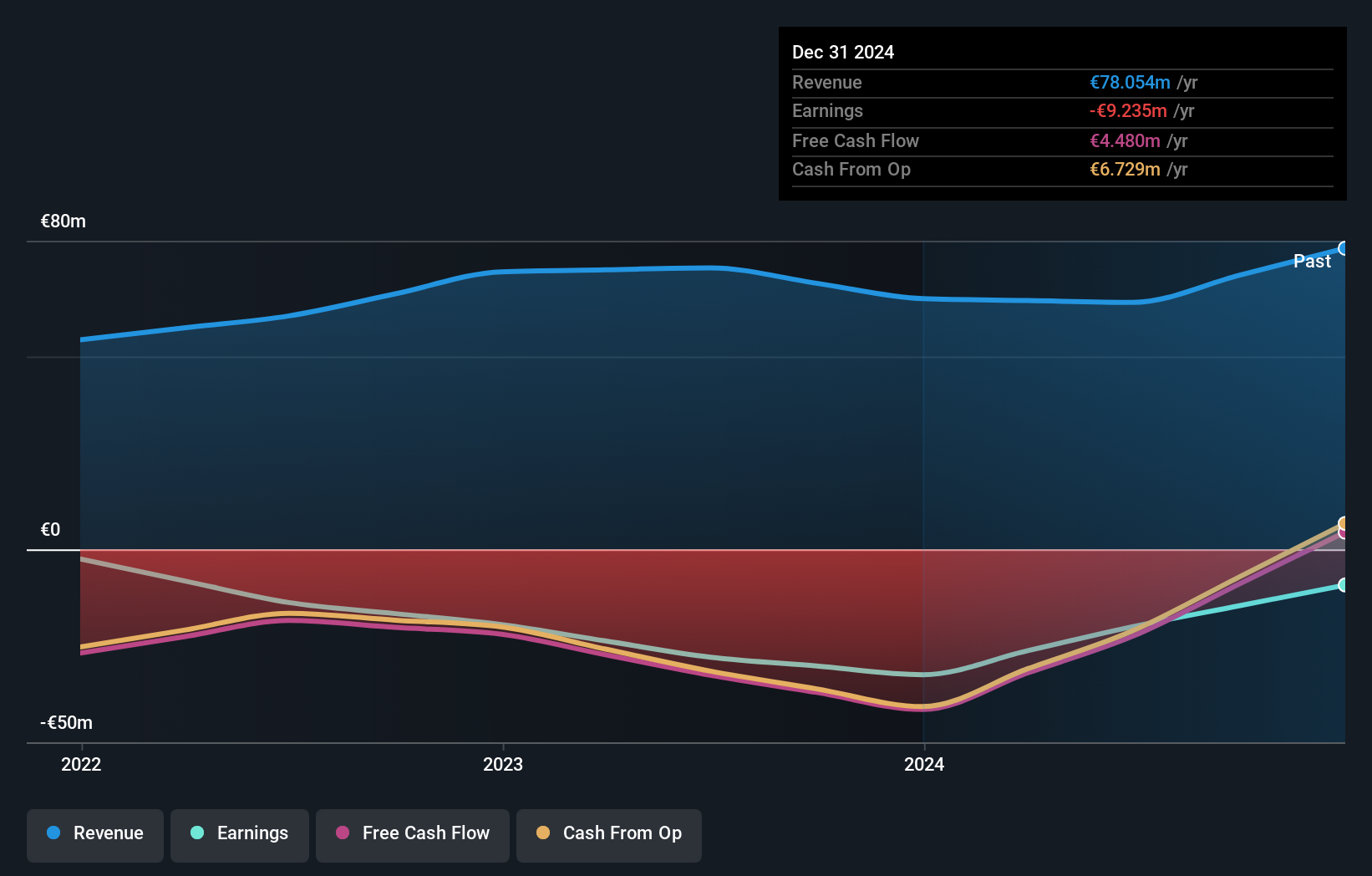- France
- /
- Communications
- /
- ENXTPA:PARRO
Parrot S.A. (EPA:PARRO) CEO Henri Seydoux's holdings dropped 12% in value as a result of the recent pullback
Key Insights
- Significant insider control over Parrot implies vested interests in company growth
- The largest shareholder of the company is Henri Seydoux with a 62% stake
- Institutions own 11% of Parrot
A look at the shareholders of Parrot S.A. (EPA:PARRO) can tell us which group is most powerful. The group holding the most number of shares in the company, around 62% to be precise, is individual insiders. In other words, the group stands to gain the most (or lose the most) from their investment into the company.
As a result, insiders as a group endured the highest losses after market cap fell by €38m.
Let's take a closer look to see what the different types of shareholders can tell us about Parrot.
See our latest analysis for Parrot

What Does The Institutional Ownership Tell Us About Parrot?
Many institutions measure their performance against an index that approximates the local market. So they usually pay more attention to companies that are included in major indices.
Parrot already has institutions on the share registry. Indeed, they own a respectable stake in the company. This can indicate that the company has a certain degree of credibility in the investment community. However, it is best to be wary of relying on the supposed validation that comes with institutional investors. They too, get it wrong sometimes. It is not uncommon to see a big share price drop if two large institutional investors try to sell out of a stock at the same time. So it is worth checking the past earnings trajectory of Parrot, (below). Of course, keep in mind that there are other factors to consider, too.

Parrot is not owned by hedge funds. With a 62% stake, CEO Henri Seydoux is the largest shareholder. This implies that they possess majority interests and have significant control over the company. Investors usually consider it a good sign when the company leadership has such a significant stake, as this is widely perceived to increase the chance that the management will act in the best interests of the company. In comparison, the second and third largest shareholders hold about 9.9% and 5.1% of the stock.
While studying institutional ownership for a company can add value to your research, it is also a good practice to research analyst recommendations to get a deeper understand of a stock's expected performance. We're not picking up on any analyst coverage of the stock at the moment, so the company is unlikely to be widely held.
Insider Ownership Of Parrot
While the precise definition of an insider can be subjective, almost everyone considers board members to be insiders. Company management run the business, but the CEO will answer to the board, even if he or she is a member of it.
Most consider insider ownership a positive because it can indicate the board is well aligned with other shareholders. However, on some occasions too much power is concentrated within this group.
It seems that insiders own more than half the Parrot S.A. stock. This gives them a lot of power. That means they own €174m worth of shares in the €278m company. That's quite meaningful. Most would argue this is a positive, showing strong alignment with shareholders. You can click here to see if those insiders have been buying or selling.
General Public Ownership
With a 22% ownership, the general public, mostly comprising of individual investors, have some degree of sway over Parrot. While this group can't necessarily call the shots, it can certainly have a real influence on how the company is run.
Private Equity Ownership
Private equity firms hold a 5.1% stake in Parrot. This suggests they can be influential in key policy decisions. Some investors might be encouraged by this, since private equity are sometimes able to encourage strategies that help the market see the value in the company. Alternatively, those holders might be exiting the investment after taking it public.
Next Steps:
It's always worth thinking about the different groups who own shares in a company. But to understand Parrot better, we need to consider many other factors. For instance, we've identified 1 warning sign for Parrot that you should be aware of.
Of course this may not be the best stock to buy. Therefore, you may wish to see our free collection of interesting prospects boasting favorable financials.
NB: Figures in this article are calculated using data from the last twelve months, which refer to the 12-month period ending on the last date of the month the financial statement is dated. This may not be consistent with full year annual report figures.
New: Manage All Your Stock Portfolios in One Place
We've created the ultimate portfolio companion for stock investors, and it's free.
• Connect an unlimited number of Portfolios and see your total in one currency
• Be alerted to new Warning Signs or Risks via email or mobile
• Track the Fair Value of your stocks
Have feedback on this article? Concerned about the content? Get in touch with us directly. Alternatively, email editorial-team (at) simplywallst.com.
This article by Simply Wall St is general in nature. We provide commentary based on historical data and analyst forecasts only using an unbiased methodology and our articles are not intended to be financial advice. It does not constitute a recommendation to buy or sell any stock, and does not take account of your objectives, or your financial situation. We aim to bring you long-term focused analysis driven by fundamental data. Note that our analysis may not factor in the latest price-sensitive company announcements or qualitative material. Simply Wall St has no position in any stocks mentioned.
About ENXTPA:PARRO
Parrot
Provides professional drones and software and services in France and internationally.
Excellent balance sheet with minimal risk.
Similar Companies
Market Insights
Community Narratives




